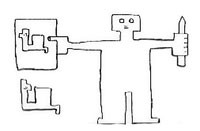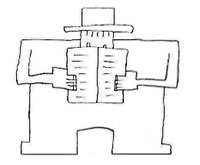Creative Writing Workshops
“I was shy. I didn’t want to read my poem, but I did and it felt good.”
Ruma Rahman, Marion Richardson School, London
For twenty years, I have been taking riddles, stories and poems into schools, and encouraging young people to write poems and tell stories themselves.
Here are some poems that people working with me have written.
I was working with a Year 5 class at Harbinger Primary School on the Isle of Dogs. We talked about the way that you can see reflections in people’s eyes if you look closely enough. I asked the children to write about what would be reflected in their eyes on an ordinary day. Habiba wrote this:
In My Eyes You Will See Reflected
In my eyes you will see reflected
my friend and my sister reading Arabic books.
In my eyes you will see reflected
cars rushing across the street.
In my eyes you will see reflected
the dark, wet rain dropping on the floor.
And you could see yourself smiling at me.
In my eyes you will see reflected
me and my friends playing football
on a hot sunny day.
In my eyes you will see reflected
the beautiful flower in front of me.
I was invited to Lewisham Bridge Primary School to get a Year Three class writing imaginatively. We read some poems about people, and thought about how the writers managed to bring the people to life. Then everyone chose a person in their life and wrote a poem about them. Roger wrote:
My Dad
When I was walking I stepped on a green, big piece of glass.
I didn’t feel it, but my dad stayed calm.
He screwed up his face as if he was feeling the pain.
Then he took it out, gently.
Tyler wrote:
My Grandad
My granddad in Jamaica
Lives in a white and red house.
He is warm-hearted.
He takes me to the market in the morning.
We buy eggs, flour, oranges and dog food.
When he laughs hard
His eyes start to water.
Doing the same exercise in a primary school in Tower Hamlets, Casey wrote:
My Granny
My granny lives in Bromley-by-Bow.
She used to live in Scotland.
When I go round to my granny’s house
she cheers me up when I am sad.
My granny is like a Scottish blanket.
Nice and cuddly.
My granny and I are good friends.
We make each other laugh.
My granny is my best friend.
When me and my mum cry
my granny always makes funny faces with her false teeth
and makes me and my mum laugh.
As part of a project called “Creative Landscapes” I worked with some excluded teenagers in Newham. They wrote poems, and then worked with musicians to put their writing to music and put on a performance in Canning Town. We looked at a photograph of an Irish farmer’s hands and talked about what you could see. Then people wrote about the hands of someone they know. Lucy wrote:
Sarah’s Hands
Sarah has smooth hands.
She moisturises her hands every day
to keep her skin from drying up.
She has a fine, gold ring on her finger.
Her hands are caring and clean.
She has short nails from biting them.
She has no yellow on her fingers
and she smokes.
That’s the hand that
gave me a birthday present.
The “Creative Landscapes” workshops happened right next to the old Royal Docks. We talked about the history of ships coming and going. We imagined sending songs off down the river, like the ships. Jason wrote:
I Float My Song
I float my song upon the river
and the ink starts to leak into the water
and turn it as blue as the sky.
Off it spins, off it blows,
off it goes into the lonely far distance.
The strong tide turns
and back it spins and back it blows
and back it comes home.
For over ten years I worked at The Cherry Trees School for boys with emotional and behavioural difficulties. Each spring I led a two-week-long writing and music project run by the Spitalfields Festival. Over a number of days I told the boys a traditional story and they wrote poems based on what they heard and imagined. When the 5-8 year old boys heard the Irish folktale “The Singing Bird” they pictured the bird in the story and tried to paint a picture of it with words. Adam wrote:
The Bird That Sings For The Day
Can you hear the bird that sings for the day
with a voice like an old clarinet?
The bird that sings for the day.
Can you see the green, yellow and blue wings
of the bird that sings for the day?
The bird that sings for the day.
Can you feel the bird that sings for the day
with beautiful eyes?
The bird that sings for the day.
Another year I told the 9-11 year old boys the Russian story “The Fire Bird”. A young man called Ivan picks up a fire bird’s feather and takes it to the palace, thinking the Tsar will be impressed. The Tsar is impressed. By Ivan’s troubles are only beginning. The Tsar tells him to catch the fire bird itself or he will be executed. As the story progresses, it is Ivan’s faithful horse that helps him solve the increasingly difficult challenges he has to face. The boys at The Cherry Trees imagined having a faithful horse of their own. James wrote:
My Horse
My horse is bright white
and my horse has a gold saddle.
My horse has glittery, silvery eyes
And my horse is strong.
My horse has a spotty tail
and it is shiny.
My horse is big, with a strong neck
and when I am in trouble
my horse carries me away.
Back in 1992 I worked as Writer in Residence at Thomas Buxton Infants School in Whitechapel. Two busy-minded classes of five year olds took part and I acted as scribe writing down the down their words. I remember it felt like juggling…keeping all their spinning ideas in the air. At the end of the term we published a booklet of forty six poems by the children, called “COCKADOODLEDOO”. This is one poem from that book, written by Maryam, Abu Arif, Shumon, Asma, Shahela and Akik:
Hopscotch With Words
We can write a poem full of different words.
Short words like
cat,
dog,
was,
car.
Long words like
helicopter,
butterfly,
shortcut,
caterpillar.
Words beginning with “Z” like
zebra,
zip,
zoo,
zap.
Silly words like
boing boing,
goo goo,
teeny weeny,
cuckoo.
Nice words like
Hello.
What’s your name?
My name is Roger.
Do you have any sisters and brothers?
Angry words like
Go out!
You are silly!
I will hit!
Shut up you!
Sad words like
No one is my friend.
My mum hit me.
He cried.
I will miss you so much, goodbye.
We can even make up words like
wohwohwoh
baba-bula
balabalabala
chucka-chuck-chuck
Because we can play hopscotch with words.
We can play hide-and-seek with words.
We can play on-it with words.
I led a series of poetry workshops for men aged 18-21 at HM Prison Rochester. This was one of several strong pieces of writing that came out of the work. It was written collectively by the group of ten young prisoners:
What You Make of It
Glittering shapes.
Distant jewels
spying like eyes.
Bright distant stars.
Silent lamps
wobbling slightly
in themidnight breeze.
Walls listen in the dark.
Am I dreaming
or am I not?
It’s cold, lonely.
Your cell is what you make of it.
I worked on a poetry and music project at Christ Church Primary School on Brick Lane. We looked at a poem called “The Song of the Sea”. The poet imagines what the sea would sing about, if it could sing – the waves, the octopuses, and the rainbow fish. The children took this idea and wrote other “Song of…” poems. Some imagined mountains singing and rivers and cities. Monir wrote this one:
Star
It makes me sing
when I see other stars
because they are my friends.
I like to sing
when I see the planet mars
because I like the colour.
I would sing
when I touch the world
because it feels smooth.
I sing
when it is night
because for me it is daylight.
I like to sing
when I see the moon
because I like the moon’s song tune.
I like Saturn planet’s ring.
That’s what all
makes me sing.



